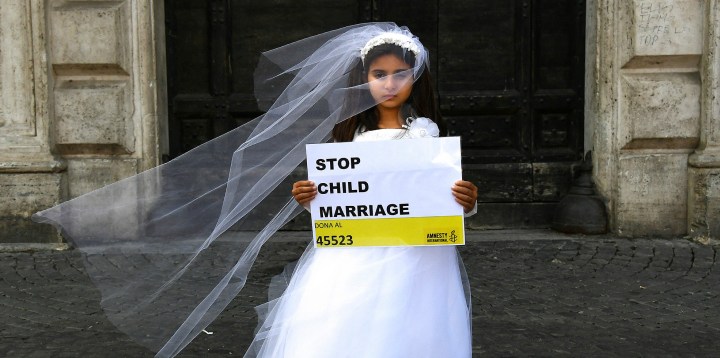CHILD MARRIAGE
Activists point to climate crisis and Covid-19 as critical factors pushing more young girls towards child marriage

UN experts have said that child marriages impede the development of young girls and rob them of future opportunities, including education, health and wellbeing. Furthermore, sexual and reproductive health rights and bodily autonomy is diminished as a result of the practice.
The impact of the Covid-19 pandemic has placed 10 million additional girls at risk of child marriage — and this is exacerbated by the climate crisis. That’s according to the United Nations Population Fund (UNFPA) and the UN Children’s Fund (Unicef), who on 11 and 12 October commemorated the fifth anniversary of the global programme to end child marriage.
Activists at the commemoration stressed that child marriages impede the development of young girls and rob them of future opportunities, education, health and wellbeing, their sexual and reproductive health rights and bodily autonomy. They urged governments and civil society to take action with the full participation of adolescent girls and boys in order to end the practice of child marriage.
Speaking on the effect of the climate crisis on child marriage, Anandita Philipose from UNFPA said that extreme weather conditions such as drought and floods brought on by the climate crisis pushed families who were already on the brink of poverty to look to child marriage to mitigate against the impact. Philipose said that families lost assets, were displaced from homes, and forced to migrate after extreme weather disasters.
An example was that families were often left poorer after droughts or floods and marrying off their young daughters translated to income in the form of a dowry as well as having one less mouth to feed.
Philipose said that parents interviewed in Kenya had stressed that they did not want to marry off their young daughters but felt compelled to, owing to the harsh economic circumstances they faced.
Bernadette Loloju from the End Female Genital Mutilation Board in Kenya said that child marriage and female genital mutilation were closely linked, particularly in Kenya, and described female genital mutilation as one of the worst forms of gender-based violence.
Loloju said that in some parts of Kenya, if women and girls did not subject themselves to female genital mutilation, they would be classed as undesirable for marriage. Her organisation was working to get governments in the region to sign a declaration to end the practice. Kenya’s President Uhuru Kenyatta had taken the lead by becoming the first president to sign this declaration.
Those in attendance at the commemoration agreed that child marriage and female genital mutilation violated the human rights of both girls and boys by reducing their economic opportunities and increasing their exposure to domestic violence. This, therefore, necessitated a holistic response that included sexual and reproductive health rights (SRHR), education and economic empowerment.
Fabienne van den Eede, Deputy Head of Unit at the European Union (EU) pledged her organisation’s ongoing commitment to ending child marriage and female genital mutilation, saying that the issues were central in achieving the UN’s gender SDGs.
The EU was in the process of finalising a €30-billion partnership with civil society organisations in Africa to work towards the accessibility of SRHR services at a national and community level. Van den Eede also highlighted the need to focus on legal interventions, institutional strengthening, survivor support, data collection, support for women’s movements and continuing to push for gender-disaggregated data which, she said, is critical in informing policy decisions.
Delegates pointed out that taking a multisectoral approach to addressing child marriages and female genital mutilation was needed and that integrating learning, creating, and the using and adapting of evidence into the work was key. DM/MC




















 Become an Insider
Become an Insider
Comments - Please login in order to comment.